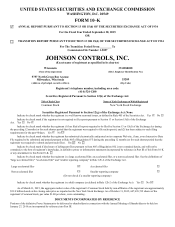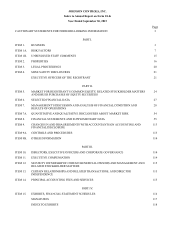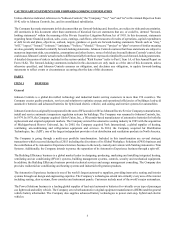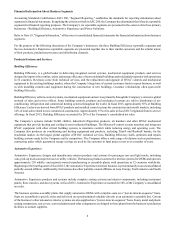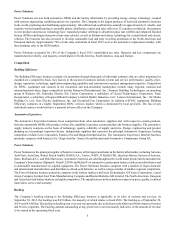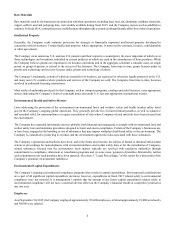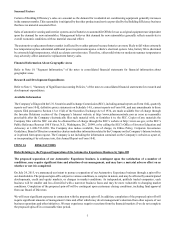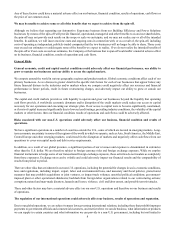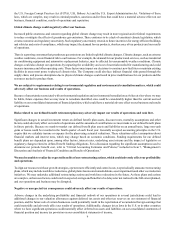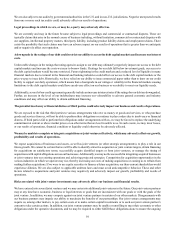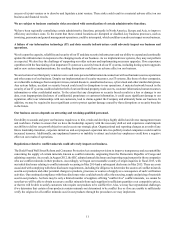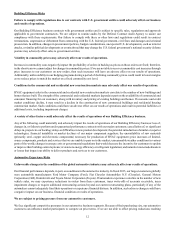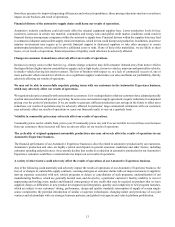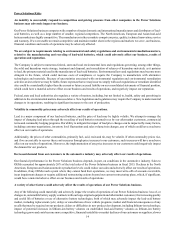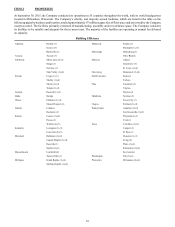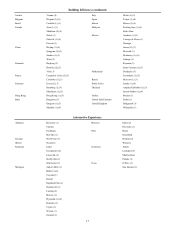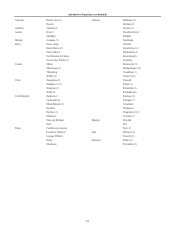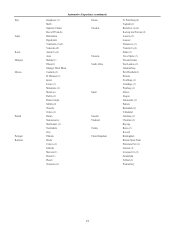Johnson Controls 2015 Annual Report Download - page 9
Download and view the complete annual report
Please find page 9 of the 2015 Johnson Controls annual report below. You can navigate through the pages in the report by either clicking on the pages listed below, or by using the keyword search tool below to find specific information within the annual report.9
the U.S. Foreign Corrupt Practices Act (FCPA), U.K. Bribery Act and the U.S. Export Administration Act. Violations of these
laws, which are complex, may result in criminal penalties, sanctions and/or fines that could have a material adverse effect on our
business, financial condition, results of operations and reputation.
Global climate change could negatively affect our business.
Increased public awareness and concern regarding global climate change may result in more regional and/or federal requirements
to reduce or mitigate the effects of greenhouse gas emissions. There continues to be a lack of consistent climate legislation, which
creates economic and regulatory uncertainty. Such regulatory uncertainty extends to future incentives for energy efficient buildings
and vehicles and costs of compliance, which may impact the demand for our products, obsolescence of our products and our results
of operations.
There is a growing consensus that greenhouse gas emissions are linked to global climate changes. Climate changes, such as extreme
weather conditions, create financial risk to our business. For example, the demand for our products and services, such as residential
air conditioning equipment and automotive replacement batteries, may be affected by unseasonable weather conditions. Climate
changes could also disrupt our operations by impacting the availability and cost of materials needed for manufacturing and could
increase insurance and other operating costs. These factors may impact our decisions to construct new facilities or maintain existing
facilities in areas most prone to physical climate risks. The Company could also face indirect financial risks passed through the
supply chain, and process disruptions due to physical climate changes could result in price modifications for our products and the
resources needed to produce them.
We are subject to requirements relating to environmental regulation and environmental remediation matters, which could
adversely affect our business and results of operations.
Because of uncertainties associated with environmental regulation and environmental remediation activities at sites where we may
be liable, future expenses that we may incur to remediate identified sites could be considerably higher than the current accrued
liability on our consolidated statements of financial position, which could have a material adverse effect on our business and results
of operations.
Risks related to our defined benefit retirement plans may adversely impact our results of operations and cash flow.
Significant changes in actual investment return on defined benefit plan assets, discount rates, mortality assumptions and other
factors could adversely affect our results of operations and the amounts of contributions we must make to our defined benefit plans
in future periods. Because we mark-to-market our defined benefit plan assets and liabilities on an annual basis, large non-cash
gains or losses could be recorded in the fourth quarter of each fiscal year. Generally accepted accounting principles in the U.S.
require that we calculate income or expense for the plans using actuarial valuations. These valuations reflect assumptions about
financial markets and interest rates, which may change based on economic conditions. Funding requirements for our defined
benefit plans are dependent upon, among other factors, interest rates, underlying asset returns and the impact of legislative or
regulatory changes related to defined benefit funding obligations. For a discussion regarding the significant assumptions used to
determine net periodic benefit cost, refer to "Critical Accounting Estimates and Policies" included in Item 7, "Management’s
Discussion and Analysis of Financial Condition and Results of Operations."
We may be unable to realize the expected benefits of our restructuring actions, which could adversely affect our profitability
and operations.
To align our resources with our growth strategies, operate more efficiently and control costs, we periodically announce restructuring
plans, which may include workforce reductions, global plant closures and consolidations, asset impairments and other cost reduction
initiatives. We may undertake additional restructuring actions and workforce reductions in the future. As these plans and actions
are complex, unforeseen factors could result in expected savings and benefits to be delayed or not realized to the full extent planned,
and our operations and business may be disrupted.
Negative or unexpected tax consequences could adversely affect our results of operations.
Adverse changes in the underlying profitability and financial outlook of our operations in several jurisdictions could lead to
additional changes in our valuation allowances against deferred tax assets and other tax reserves on our statement of financial
position, and the future sale of certain businesses could potentially result in the repatriation of accumulated foreign earnings that
could materially and adversely affect our results of operations. Additionally, changes in tax laws in the U.S. or in other countries
where we have significant operations could materially affect deferred tax assets and liabilities on our consolidated statements of
financial position and income tax provision on our consolidated statements of income.

